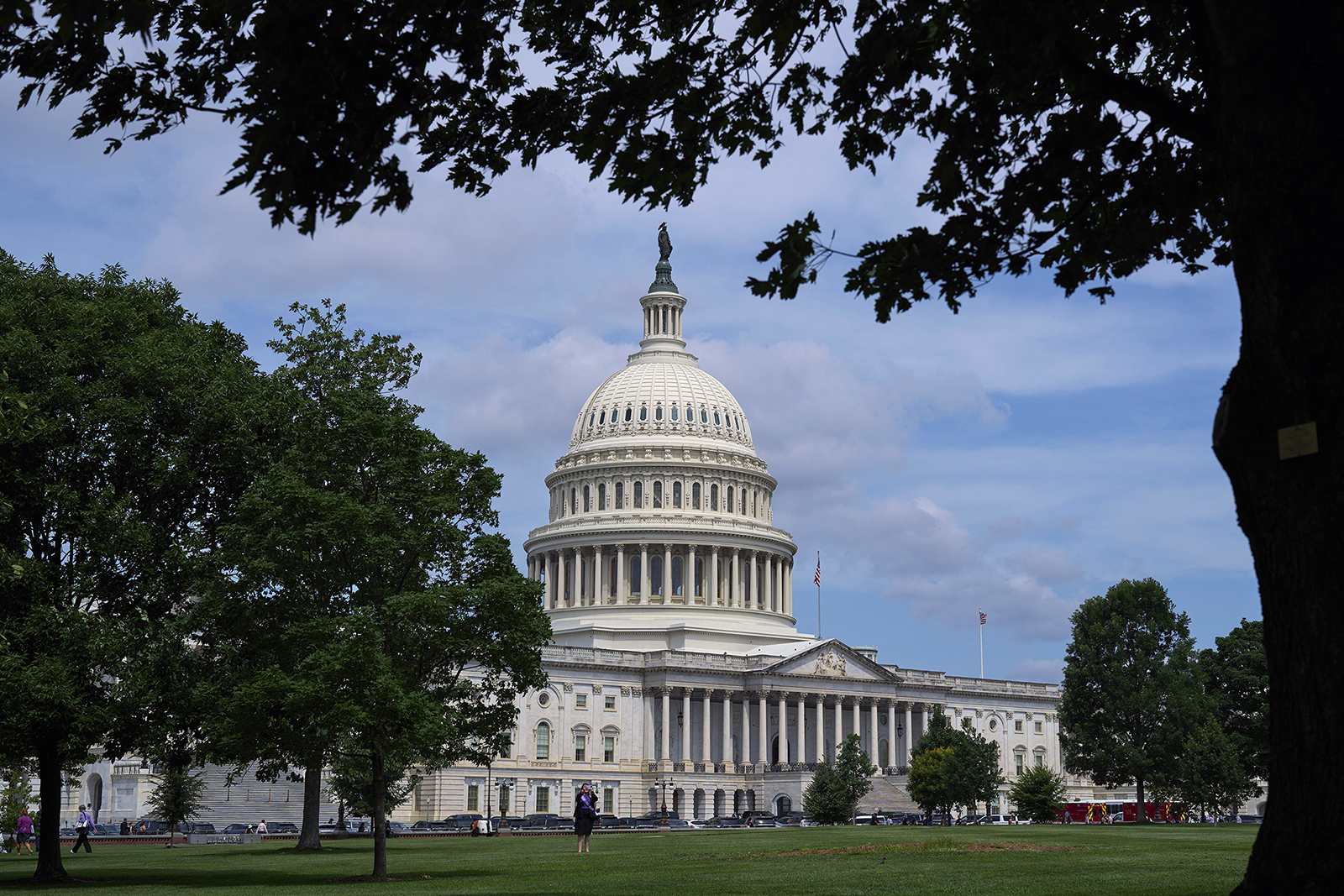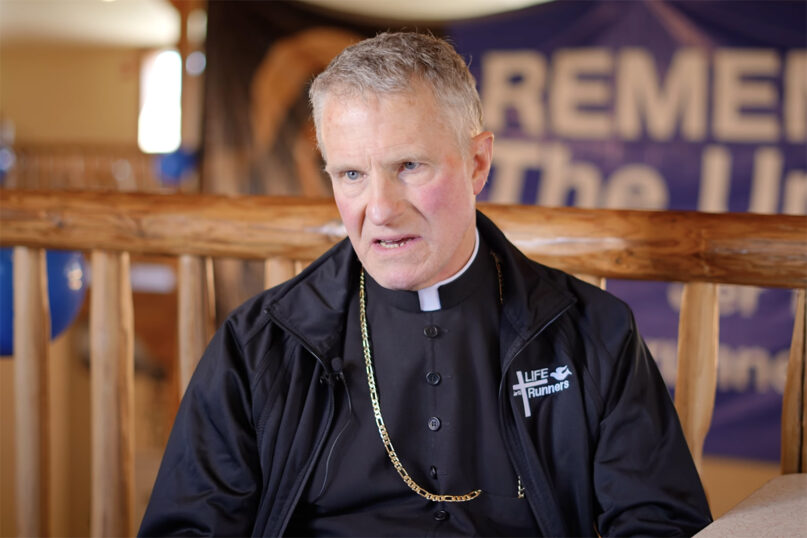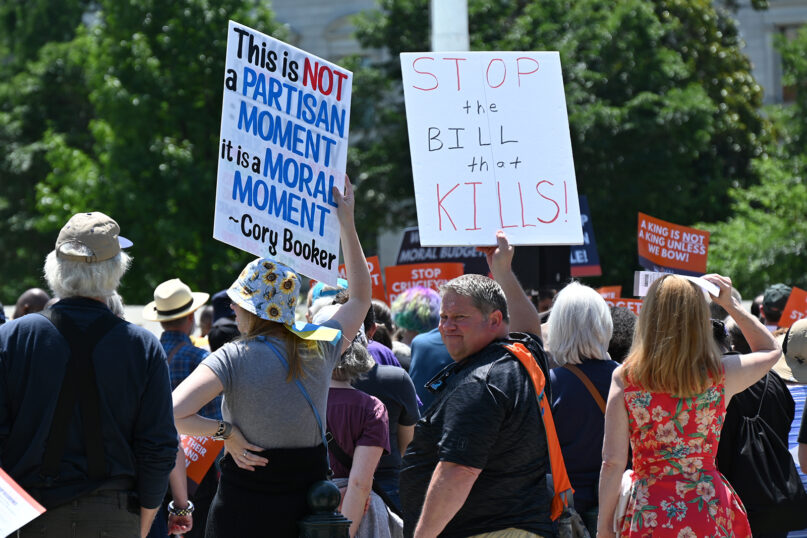
(RNS) — In an unusual display of public disagreement among U.S. Catholic hierarchy, bishops signed on to two competing letters to lawmakers on Thursday (June 26) regarding the Republican-led federal budget proposal containing a massive funding expansion for immigration enforcement, with each letter exhibiting different levels of criticism of the bill.
The U.S. Conference of Catholic Bishops, the umbrella organization that typically represents U.S. prelates in political matters, took a firm but mixed approach to the “One Big Beautiful Bill Act” in a letter. Building off of a separate statement from late May that expressed a combination of praise and concern about the bill, USCCB leaders began their new letter by stating they are “grateful for provisions that promote the dignity of human life and support parental choice in education” in the budget, such as efforts to curtail public funding for abortion providers such as Planned Parenthood.
But the letter also included a lengthy critique, urging senators — who are set to vote on the bill as soon as Friday — to “make drastic changes to the provisions that will harm the poor and vulnerable.” The letter breaks down the USCCB’s opposition to proposed cuts to food assistance programs, health care initiatives such as Medicaid and clean energy incentives.
In a statement released alongside the letter, conference President Archbishop Timothy Broglio, who leads the Archdiocese for the Military Services, referred to Pope Leo XIV to argue that politicians should “promote and protect the common good.” The budget proposal, he said, “does not answer that call.”
“It takes from the poor to give to the wealthy,” Broglio’s statement read. “It provides tax breaks for some while undermining the social safety net for others through major cuts to nutrition assistance and Medicaid. It fails to protect families and children by promoting an enforcement-only approach to immigration and eroding access to legal protections. It harms God’s creation and future generations through cuts to clean energy incentives and environmental programs.”
However, in a different letter released on the same day, a coalition of other Catholic bishops joined with a U.S. interfaith group in going a step further by explicitly asking senators not to vote for the bill.

Archbishop Timothy Broglio in April 2025. (Video screen grab)
“From our various faith perspectives, the moral test of a nation is how it treats those most in need of support. In our view, this legislation will harm the poor and vulnerable in our nation, to the detriment of the common good,” the interfaith leaders wrote.
The letter’s 42 signers include Cardinals Robert McElroy of Washington, D.C., and Joseph Tobin of Newark, New Jersey and other Catholic bishops; Imam Jamal Rahman of the Interfaith Community Sanctuary of Seattle; Washington; Rabbi Daniel Weiner of Seattle; and Episcopal Bishop Philip LaBelle of Olympia, Washington, among top signatories.
In addition to Catholics, Episcopalians, Muslims and Jews, the letter included leaders from the Evergreen Baptist Association, the African Methodist Episcopal Church, the Presbyterian Church (U.S.A.), the New Mexico Conference of Churches, the Evangelical Lutheran Church in America and the National Latino Evangelical Coalition.
Although interfaith letters about legislation are common, it is unusual for a group of U.S. Catholic bishops to sign on and for prelates to join an effort that supersedes the declarations of the USCCB.
The interfaith letter criticized how the budget bill would continue to fund President Donald Trump’s ongoing immigration crackdown, which has been widely opposed by religious groups across the U.S. In the letter, leaders said the bill “provides tens of billions of dollars to the government to undertake a mass deportation campaign which will separate US families, harm US-citizen and immigrant children, and sow chaos in local communities.”
They also warned the funding “will be used to target faith communities” because of a Trump policy change allowing immigration enforcement in houses of worship. They wrote they have already witnessed a reduction in attendance at their services because of the “threat of enforcement.”

A sign during a rally against the current budget bill, Tuesday, June 10, 2025, in Washington. (RNS photo/Jack Jenkins)
Just this month, apparent immigration enforcement actions occurred in California at at least two Catholic churches and a Disciples of Christ church — actions activists and faith leaders said likely would not have happened had the Trump administration not altered existing policy. The change is currently the subject of a lawsuit filed against the Trump administration by dozens of religious groups, including several represented among the signers of the interfaith letter, such as the Episcopal Church.
In the letter, the interfaith leaders also raised concerns about increased funding for a border wall they “believe will drive migrants into the most remote regions of the border and lead to an increase in migrant deaths,” and about cuts to health care and food assistance, citing a Congressional Budget Office estimate that the bill “transfers wealth from those in the bottom 10 percent of income to those in the top 10 percent of income in our nation.”
Instead, they advocated for legal avenues for immigration and a way for undocumented immigrants who have lived in the U.S. for years to legalize their status.
The interfaith letter echoes Catholic immigration advocates who have expressed frustration with USCCB leadership for not condemning the budget bill completely, given the large increases in funding for immigration enforcement. The version of the bill that passed the House of Representatives quadruples U.S. Customs and Border Protection’s budget and increases immigration detention capacity by 800%.
Kevin Appleby, the USCCB’s former migration policy director and current senior fellow for policy at the Center for Migration Studies, a New York institute that studies migration and policies, told Religion News Service earlier this month the bill “will fuel mass immigration raids like we’ve never seen.”
“If the bishops fail to oppose that bill, then they’re facilitating these raids,” he said.

The U.S. Conference of Catholic Bishops meets at the Baltimore Marriott Waterfront hotel in Baltimore, Md., in November 2024. (RNS photo/Aleja Hertzler-McCain)
The interfaith letter comes on the heels of an editorial penned earlier this month by Archbishop John Wester, who oversees the Catholic Archdiocese of Santa Fe, in which the cleric called on bishops to do more to oppose a bill he said “betrays the poor.” In an RNS interview earlier this month, Wester, who signed the interfaith bill, said he believes people were hoping bishops would come out stronger against the bill and that he planned to encourage fellow bishops gathering for a mid-June USCCB retreat in San Diego to join him in speaking out.
“I think the bill is robbing from the poor to give to the rich,” Wester said. “It’s the opposite of the Robin Hood effect.”
Bishop John Stowe, a signer of the interfaith letter who oversees the Catholic Diocese of Lexington in Kentucky, said he and other religious leaders felt compelled to make their voices heard.
“The treatment of immigrants or those profiled as immigrants is unconscionable and we must do everything we can to stop this cruelty, not provide additional funding at the expense of needed health care and social services,” Stowe said in a text message Friday morning.

Demonstrators display signs at a Moral Mondays rally outside the U.S. Supreme Court, Monday, June 2, 2025, in Washington. (RNS photo/Jack Jenkins)
Organizers say the interfaith letter is the beginning of a larger collaboration. The Rev. Gabriel Salguero, a signatory who leads the National Latino Evangelical Coalition, is promoting the letter alongside other efforts, including radio ads in both English and Spanish, to counter the bill.
“This is not the pro-life, pro-family, pro-worker vision of our faith,” Salguero says in the ad, referring to the bill.
The interfaith letter’s Catholic signatories feature several bishops who were placed in prominent positions by Pope Francis or saw recent promotions by Pope Leo XIV, but who have not been promoted as leaders in the USCCB.
In one of his final letters before his death, Francis wrote a letter to the U.S. bishops condemning the Trump administration’s approach to immigration policy, which included a disavowal of the theology that Vice President JD Vance has used to justify a mass deportation campaign.
Some observers have argued the U.S. bishops’ failure to elevate those in favor at the Vatican within the USCCB is a sign of opposition to Francis’ teaching. Cardinal Tobin of Newark, a top signatory on the letter, lost a 2022 bid for the USCCB’s No. 3 position as secretary despite cardinals typically having an advantage in such races. Other Catholic bishops among the signatories, like McElroy and Seattle Archbishop Paul Etienne, were among those Francis chose as delegates for the Synod on Synodality, or recently received promotions to higher offices, such as San Diego Bishop-elect Michael Pham and Detroit Archbishop Edward Weisenberger.
While Leo has had less time to make his close allies known, the interfaith letter suggests a coalition of Francis-aligned bishops believe the USCCB is not doing enough to meet the moment.
Shifting the USCCB’s more buttoned-down, conservative-leaning approach to public advocacy may prove difficult. Even when the conference has opposed Trump’s immigration policies, it has often done so on its own terms: earlier this year, when a group of religious organizations collectively sued the administration over its decision to halt to the refugee resettlement program, the USCCB filed a separate solo lawsuit rather than join the other faith groups.
But as pressure mounts, the USCCB’s go-it-alone approach may already be changing. In March, the conference partnered with evangelical groups to release a report noting that about 1-in-5 Catholics and 1-in-12 Christians are at risk of deportation or losing a member of their household to deportation with the current policies in place.
And despite their differences, both letters add to growing faith-based pushback to the budget proposal. Over the past two months, the Rev. William Barber and other religious leaders have been repeatedly arrested in the U.S. Capitol Rotunda while praying against it. Multiple groups of religious leaders have also rallied on Capitol Hill and on the U.S. Capitol steps, protesting and praying with activists and Democratic lawmakers to decry the proposed legislation.
